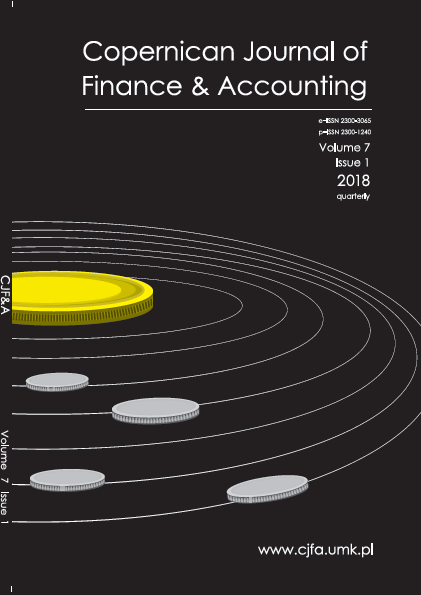USING ACCOUNTING INFORMATION FOR STRATEGIC DECISION-MAKING IN A MULTI-SEGMENTED COMPANY
DOI:
https://doi.org/10.12775/CJFA.2018.002Keywords
a multi-segmented company, strategic decisions, accounting information, operating segmentsAbstract
The reason of being of corporate accounting is not only to record, interpret and present data about existing business processes, but also to provide information for supporting main decision-making activities of management. This article presents basic problems outlining the relationship between accounting and strategic management of companies. The main ideas are connected with the philosophy of presenting information in financial and management reports, on the one hand, and the levels of management activities and their relationship to the development strategy of the organization, on the other hand. The aim is to trace the relationship between the segmental accounting and the strategic management of diversified organizations and to highlight problem areas, deserving management attention. The research methods of analysis and synthesis have been used. The outcomes of the research show that choosing a proper cost structure and allocation basis at operating segment level will contribute to increasing the capabilities of managers to make better corporate strategic decisions.References
Arun, K. (2015). Effect of knowledge sharing and supply chain management on organizational performance. International Journal of Knowledge-Based Organizations (IJKBO), 5(3), 19–32.
Bojarenko, J. (2017). Variability of accounting policies – advantages and disadvantages. Copernican Journal of Finance & Accounting, 6(3), 9–19. http://dx.doi.org/10.12775/CJFA.2017.013.
Ciemleja, G., & Lace, N. (2011). The model of sustainable performance of small and medium-sized enterprise. Engineering economics, 22(5), 501-509. http://dx.doi.org/10.5755/j01.ee.22.5.968.
European Commission (2007). Commission regulation (EC) No 1347/2007, Official Journal of the European Union, L 300/32.
Ernst & Young (2009). IFRS 8 Operating Segments. Implementation Guidance, http://www.ey.com/Publication/vwLUAssets/IFRS_8_Operating_segments_Implementation_guidance/$FILE/IFRS_8_Operating_Segments_IG.pdf (accessed: 28.06.2009).
Hart, S., & Roslender, R. (2003). In Search of Strategic Management Accounting: Theoretical and Field Study Perspectives. Management Accounting Research, 14(3), 255–279. http://dx.doi.org/10.1016/S1044-5005(03)00048-9.
Hofbauer, G. (2017). Technische Beschaffung – Der Beschaffungsprozess, Schriftenreihe Strategisches Beschaffungsmanagement, Band 2. Berlin: Seiten.
IFRS 8 (2017). International Financial Reporting Standard 8 – Operating Segments: 29th March, 2017, http://www.iasplus.com/en/news/2017/03/ifrs-8-improvements (accessed: 29.03.2017).
Khocha, N. (2017). The organization of management accounting at small enterprises in Ukraine. Baltic Journal of Economic Studies, 3(4), 271–279.
Mitev, B. (2016). Essential Characteristics of Strategic Alliances. Izvestia, Journal of the Union of Scientists – Varna, Economic Sciences Series, 1, 109–115.
Papazov, E. (2012). Strategic management. Ruse: Avangard print. (in Bulgarian)
Papazov, E., & Mihaylova, L. (2011). Product Diversification in SMEs as Anti-Crisis Response. Izvestiya – Journal of Varna Economic University, 2, 122–127. (in Bulgarian)
Papazov, E., & Mihaylova, L. (2015). Approaches to strategy-driven sectoral competition analysis of business organizations. In Perspectives of Business and Entrepreneurship Development. Proceedings of Selected Papers. Brno: Brno University of Technology.
Pepur, M., Mihanović, Z., & Pepur, S. (2013). Analysis of the effect of perceived service quality to the relationship quality on the business-to-business market. Management: Journal of Contemporary Management Issues, 18(2), 97–109.
Ruland, R. (1984). Duty, obligation and responsibility in accounting policy making. Journal of Accounting and Public Policy, 14(3), 223–237. http://dx.doi.org/10.1016/0278-4254(84)90018-8.
Šimberová, I. (2008). Marketing approach to stakeholder management. In A. Pabedinskaitė (Ed.). 5th International Scientific Conference “Business and Management”. Vilnius: Technika.
Simeonov, O., & Lambovska, M. (2012). A Suggestion about Potentialities for the SWOT Analysis’ Development concerning Threats. Economics and Management, 2(1), 94–103.
Škoda, M., Lengyelfalusy, T., & Gabrhelová, G. (2017). Creative accounting practices in Slovakia after passing financial crisis. Copernican Journal of Finance & Accounting, 6(2), 71–86. http://dx.doi.org/10.12775/CJFA.2017.012.
Trifonova, S., & Atanassov, A. (2016). Assessing the Impact of the Global Financial Crisis on Bulgaria‘s Economy from the Sector Perspective. International Journal of Emerging Research in Management & Technology, 5(5), 5–19.
Yonkova, B. (2005). Sectoral information in the system of financial reporting and managerial accounting. Journal “Economic alternatives”, 7(1), 94–110.
Downloads
Published
How to Cite
Issue
Section
Stats
Number of views and downloads: 1155
Number of citations: 0



